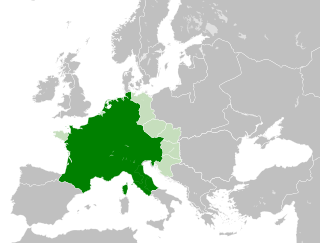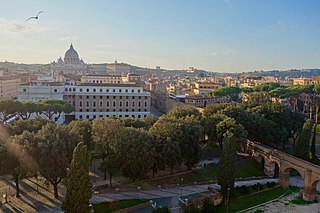
The history of Europe is traditionally divided into four time periods: prehistoric Europe, classical antiquity, the Middle Ages, and the modern era.

The second millennium of the Anno Domini or Common Era was a millennium spanning the years 1001 to 2000.

The Carolingian Empire (800–888) was a Frankish-dominated empire in Western and Central Europe during the Early Middle Ages. It was ruled by the Carolingian dynasty, which had ruled as kings of the Franks since 751 and as kings of the Lombards in Italy from 774. In 800, the Frankish king Charlemagne was crowned emperor in Rome by Pope Leo III in an effort to transfer the Roman Empire from the Byzantine Empire to Western Europe. The Carolingian Empire is considered the first phase in the history of the Holy Roman Empire.

The Carolingian Renaissance was the first of three medieval renaissances, a period of cultural activity in the Carolingian Empire. It occurred from the late 8th century to the 9th century, taking inspiration from the Christian Roman Empire of the fourth century. During this period, there was an increase of literature, writing, visual arts, architecture, music, jurisprudence, liturgical reforms, and scriptural studies.

Early modern Europe, also referred to as the post-medieval period, is the period of European history between the end of the Middle Ages and the beginning of the Industrial Revolution, roughly the late 15th century to the late 18th century. Historians variously mark the beginning of the early modern period with the invention of moveable type printing in the 1450s, the Fall of Constantinople and end of the Hundred Years’ War in 1453, the end of the Wars of the Roses in 1485, the beginning of the High Renaissance in Italy in the 1490s, the end of the Reconquista and subsequent voyages of Christopher Columbus to the Americas in 1492, or the start of the Protestant Reformation in 1517. The precise dates of its end point also vary and are usually linked with either the start of the French Revolution in 1789 or with the more vaguely defined beginning of the Industrial Revolution in late 18th century England.

The Kingdom of the Franks, also known as the Frankish Kingdom, the Frankish Empire or Francia, was the largest post-Roman barbarian kingdom in Western Europe. It was ruled by the Frankish Merovingian and Carolingian dynasties during the Early Middle Ages. Francia was among the last surviving Germanic kingdoms from the Migration Period era.

The history of Greece encompasses the history of the territory of the modern nation-state of Greece as well as that of the Greek people and the areas they inhabited and ruled historically. The scope of Greek habitation and rule has varied throughout the ages and as a result, the history of Greece is similarly elastic in what it includes. Generally, the history of Greece is divided into the following periods:
The early modern period of modern history spans the period after the Late Middle Ages of the post-classical era to the beginning of the Age of Revolutions. Although the chronological limits of this period are open to debate, the timeframe is variously demarcated by historians as beginning with the fall of Constantinople in 1453, the Renaissance period in Europe and Timurid Central Asia, the end of the Crusades, the Age of Discovery, and ending around the French Revolution in 1789, or Napoleon's rise to power.

The military history of France encompasses an immense panorama of conflicts and struggles extending for more than 2,000 years across areas including modern France, Europe, and a variety of regions throughout the world.

East Francia or the Kingdom of the East Franks was a successor state of Charlemagne's empire ruled by the Carolingian dynasty until 911. It was created through the Treaty of Verdun (843) which divided the former empire into three kingdoms.

The Franks were originally a Germanic people who lived near the Lower Rhine, on the northern frontier of the late Roman Empire, but they successfully expanded their power and influence during the Middle Ages, until much of the population of western Europe, particularly in or near France, were commonly described as Franks, for example in the context of their joint efforts during the crusades starting in the 11th century. This expansion came about because the romanized Frankish dynasties based within the collapsing Western Roman Empire first became the rulers of the whole region between the rivers Loire and Rhine, and then subsequently imposed power over many other post-Roman kingdoms both inside and outside the old empire.

The Kingdom of France is the historiographical name or umbrella term given to various political entities of France in the medieval and early modern period. It was one of the most powerful states in Europe since the High Middle Ages. It was also an early colonial power, with colonies in Asia and Africa, and the largest being New France in North America.
The modern era is the period of human history that succeeds the Middle Ages up to the present. This terminology is a historical periodization that is applied primarily to European and Western history.
The military history of Europe refers to the history of warfare on the European continent. From the beginning of the modern era to the second half of the 20th century, European militaries possessed a significant technological advantage, allowing its states to pursue policies of expansionism and colonization until the Cold War period. European militaries in between the fifteenth century and the modern period were able to conquer or subjugate almost every other nation in the world. Since the end of the Cold War, the European security environment has been characterized by structural dominance of the United States through its NATO commitments to the defense of Europe, as European states have sought to reap the 'peace dividend' occasioned by the end of the Cold War and reduce defense expenditures. European militaries now mostly undertake power projection missions outside the European continent. Recent military conflicts involving European nations include the 2001 War in Afghanistan, the 2003 War in Iraq, the 2011 NATO Campaign in Libya, and various other engagements in the Balkan and on the African continent. After 2014, the Russian annexation of Crimea and the ongoing Russo-Ukrainian War prompted renewed scholarly interest into European military affairs. For further the context see History of Europe.

A rump state is the remnant of a once much larger state, left with a reduced territory in the wake of secession, annexation, occupation, decolonization, or a successful coup d'état or revolution on part of its former territory. In the last case, a government stops short of going into exile because it controls part of its former territory.
The Robertians are the proposed Frankish family which was ancestral to the Capetian dynasty, and thus to the royal families of France and of many other countries. The Capetians appear first in the records as powerful nobles serving under the Carolingian dynasty of Charlemagne in West Francia, which later became France. As their power increased, they came into conflict with the older royal family and attained the crown several times before the eventual start of the continuous rule of the descendants of Hugh Capet.

Western culture, also known as Western civilization, Occidental culture, or Western society, refers to the diverse heritage of social norms, ethical values, traditional customs, belief systems, political systems, artifacts and technologies of the Western world. The term may refer to the cultures of countries with historical ties to a European country, or number of European countries, and the variety of cultures within Europe itself. The earliest concept of Europe as a cultural sphere appeared during the Carolingian Renaissance of the 9th century, which reflected to the territories of the Western Christianity. However "European" as cultural term did not include the territories where the Orthodox Church or Islam represented the dominant religion until 19th century. Western culture originates from the mixing of Greco-Roman culture, Christian culture and Germanic culture.

The history of Turkey, understood as the history of the region now forming the territory of the Republic of Turkey, includes the history of both Anatolia and Eastern Thrace. These two previously politically distinct regions came under control of the Roman Empire in the second century BC, eventually becoming the core of the Roman Byzantine Empire. For times predating the Ottoman period, a distinction should also be made between the history of the Turkic peoples, and the history of the territories now forming the Republic of Turkey From the time when parts of what is now Turkey were conquered by the Seljuq dynasty, the history of Turkey spans the medieval history of the Seljuk Empire, the medieval to modern history of the Ottoman Empire, and the history of the Republic of Turkey since the 1920s.
The following outline is provided as an overview of and topical guide to the history of Western civilization, a record of the development of human civilization beginning in Ancient Greece and Ancient Rome, and generally spreading westwards.